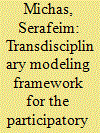| Srl | Item |
| 1 |
ID:
191221


|
|
|
|
|
| Summary/Abstract |
The decarbonization of the electricity sector is at the core of the European agenda, with renewable energy sources playing a leading role. A major challenge emerging with increasing shares of intermittent renewables is their efficient integration. To overcome this challenge, electricity storage systems are identified as components which will be inseparable from renewable generation in the following years. However, what are the available pathways for the capacity evolution of each generating technology? How do different capacity combinations perform in terms of pledged renewable penetration targets and investment costs? Is there an optimal capacity combination of renewables and storage? This article presents a modelling framework featuring detailed storage operation simulation and adaptive policy design, assessing these inquiries. To demonstrate its applicability, it is used to explore plausible wind, solar, and storage configurations in Greece. The results suggest that the proportion of wind and solar power is significantly affecting the timing and required capacity for storage, the potential for renewable electricity integration, as well as the costs needed for their achievement. Overall, the study demonstrates feasible pathways leading from the current status quo in Greece and towards the milestone horizon of 2030, concluding with key implications for policy and practice.
|
|
|
|
|
|
|
|
|
|
|
|
|
|
|
|
| 2 |
ID:
176682


|
|
|
|
|
| Summary/Abstract |
Efficient policymaking is crucial towards climate change mitigation. However, policies’ successful implementation depends largely on the context where they are applied. Classic decision-making used to be based on a static plan that was considered optimal for the “most likely” future contextual outcome. However, predicting the most probable evolution of this context has been proved unsuccessful, since it is vulnerable to unanticipated parameter change. Dynamic Adaptive Policy Pathways can address this problem focusing on the design of short-term policies, with simultaneous definition of adaptive interventions to be chosen on the long-term. This article presents a transdisciplinary modeling framework, which builds on the original Dynamic Adaptive Policy Pathways methodology. To demonstrate the applicability of this framework the authors used it to explore the evolution of the small-scale solar photovoltaics share in Greece, towards the achievement of the national capacity targets of 2025 and 2030. Model outcomes facilitated the identification of several pathways achieving the capacity targets, while reducing the risk for retroactive policy changes. Overall, the presented study demonstrates potential to support the design of adaptive policies over contextual evolutions so that social, economic and technological aspects of integrative planning are balanced towards the achievement of climate targets.
|
|
|
|
|
|
|
|
|
|
|
|
|
|
|
|